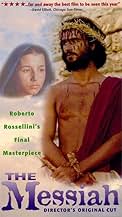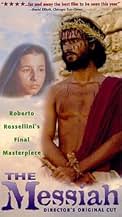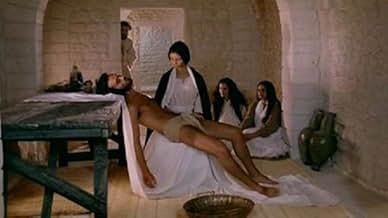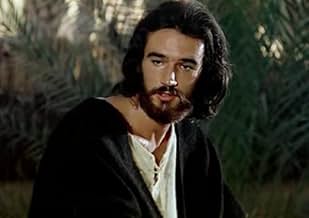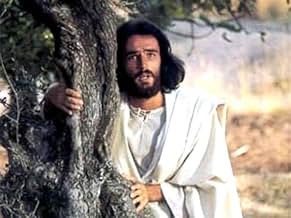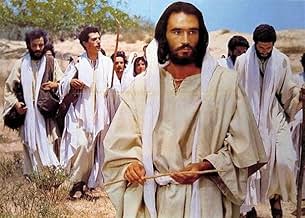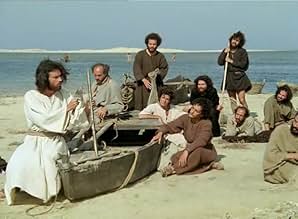Adicionar um enredo no seu idiomaThe story of the life of Jesus Christ.The story of the life of Jesus Christ.The story of the life of Jesus Christ.
- Direção
- Roteiristas
- Artistas
- Direção
- Roteiristas
- Elenco e equipe completos
- Produção, bilheteria e muito mais no IMDbPro
Avaliações em destaque
Dubbed "the most Catholic of all film directors" by one critic, I guess it was only a matter of time before Roberto Rossellini tackled the life of Christ on celluloid. Ironically, this he did in what proved to be his last feature film which was, in itself, a follow-up to his TV mini-series ACTS OF THE APOSTLES (1969). That earlier work was interesting for treating little-known passages from the New Testament but, with an unhurried pace and a generally unassuming tone, the end result was decidedly meandering. Conversely, THE MESSIAH presents all-too-familiar events with the overall effect feeling lengthy still, yet distinctly more cinematic. That said, it starts off with the arrival of the Jews in the Promised Land and the appointment of their first king (Saul) before moving on to the life of Christ; actually, this is also one of the few films to show the famous incident in which Jesus is lost in the temple as a boy. Unsurprisingly, it doesn't stray much from the spirit or word of the Gospels: even so, in the throes of an agonizing death, Herod The Great (played by Vittorio Caprioli though his trademark flustered demeanor is downplayed by having his voice dubbed) is seen planning the annihilation of his own subjects akin to the practice of ancient Egyptian rulers!
Incidentally, the rich and commanding voice of Christ himself is supplied by Enrico Maria Salerno a superb actor in his own right who had actually already handled the very same task in THE GOSPEL ACCORDING TO ST. MATTHEW (1964) which is effectively contrasted with the inconspicuous appearance of the young man who appears in the role (perhaps best approximating the Lothaire Bluteau of Jesus OF MONTREAL [1989]). This Messiah, then, is far removed from the striking good-looks of Jeffrey Hunter (KING OF KINGS [1961]) and Robert Powell (the Jesus OF NAZARETH [1977] TV mini-series) or the brooding power of Max von Sydow (THE GREATEST STORY EVER TOLD [1965]) and Willem Dafoe (THE LAST TEMPTATION OF Christ [1988])! Naturally, the bulk of the narrative is devoted to Christ's public life though no overdue emphasis is placed on the miracles he performed (these are mentioned but rarely seen) which also provides the film with its essential core since the latter section, revolving around the more commonly-depicted events of Jesus' trial (where Jean Martin, the French Colonel in THE BATTLE OF ALGIERS [1966], nonetheless makes for a fine Pontius Pilate), crucifixion and eventual resurrection are curiously skimped here!
The subplot involving John The Baptist, however, is quite nicely handled; by the way, the only other recognizable face in the cast is that of Tina Aumont (even if her contribution amounts to no more than a few minutes of screen-time!) as the adulteress Christ famously pardons by denouncing her pursuers instead. The score is, once again, by Mario Nascimbene though it's not as prominent as his work on ACTS OF THE APOSTLES. On the visual side, the film seems closest to the contemporaneous Jesus OF NAZARETH yet the lyrical style and quiet dignity on display makes of THE MESSIAH a more than worthy companion piece to Pier Paolo Pasolini's aforementioned (and more renowned) THE GOSPEL ACCORDING TO ST. MATTHEW. With this in mind, while perhaps not the definitive film on the subject, it certainly emerges as an underrated achievement both among the myriad treatments (including those by such great directors as D. W. Griffith, Carl Theodor Dreyer, Cecil B. DeMille and Abel Gance) of Christ's life over the years and in Rossellini's own highly respected canon.
Incidentally, the rich and commanding voice of Christ himself is supplied by Enrico Maria Salerno a superb actor in his own right who had actually already handled the very same task in THE GOSPEL ACCORDING TO ST. MATTHEW (1964) which is effectively contrasted with the inconspicuous appearance of the young man who appears in the role (perhaps best approximating the Lothaire Bluteau of Jesus OF MONTREAL [1989]). This Messiah, then, is far removed from the striking good-looks of Jeffrey Hunter (KING OF KINGS [1961]) and Robert Powell (the Jesus OF NAZARETH [1977] TV mini-series) or the brooding power of Max von Sydow (THE GREATEST STORY EVER TOLD [1965]) and Willem Dafoe (THE LAST TEMPTATION OF Christ [1988])! Naturally, the bulk of the narrative is devoted to Christ's public life though no overdue emphasis is placed on the miracles he performed (these are mentioned but rarely seen) which also provides the film with its essential core since the latter section, revolving around the more commonly-depicted events of Jesus' trial (where Jean Martin, the French Colonel in THE BATTLE OF ALGIERS [1966], nonetheless makes for a fine Pontius Pilate), crucifixion and eventual resurrection are curiously skimped here!
The subplot involving John The Baptist, however, is quite nicely handled; by the way, the only other recognizable face in the cast is that of Tina Aumont (even if her contribution amounts to no more than a few minutes of screen-time!) as the adulteress Christ famously pardons by denouncing her pursuers instead. The score is, once again, by Mario Nascimbene though it's not as prominent as his work on ACTS OF THE APOSTLES. On the visual side, the film seems closest to the contemporaneous Jesus OF NAZARETH yet the lyrical style and quiet dignity on display makes of THE MESSIAH a more than worthy companion piece to Pier Paolo Pasolini's aforementioned (and more renowned) THE GOSPEL ACCORDING TO ST. MATTHEW. With this in mind, while perhaps not the definitive film on the subject, it certainly emerges as an underrated achievement both among the myriad treatments (including those by such great directors as D. W. Griffith, Carl Theodor Dreyer, Cecil B. DeMille and Abel Gance) of Christ's life over the years and in Rossellini's own highly respected canon.
This is an incredible movie, and for many reasons. No one in Hollywood could make such a low-key, authentic, and INTELLIGENT historic drama, especially considering subject matter. The first 20 minutes is a concise and brilliant history of the Jews. And then the life: It is the life of Jesus without the miracles. Like the priest in Open City (by Rossellini), R understands that the struggle is to live a good life. Most Biblical movies are a total insult. This is extraordinary. The actors are believable. It feels raw -- but controlled raw, if that makes sense. Again: authentic. Believable.
It is a Rossellini. You feel it scene by scene. Different by other Jesus portraits, it represents the honest - precise portrait of great teacher. The words are fruit of work of hands. The message is simple and the sacrifice propose a special form of reddemption.
Sure, at the first sight, after the gallery of portraits of historical personalities, the temptation is to believe than Messiah is just a piece from the chain.
Obvious, it is more. The portrait of Saint Mary, the solutions for Passion and Resurrection or for the grave of Lazarus, the silence and calm respired by the film, the mathematical demonstration of the presence of Jesus, the eliptic speech about Him , the status of hakawati of the Savior , the reference to Pietta by Michelangelo are just proves of this.
Provocative in personal way.
Dialogue with the viewer.
Far by blockbusters about same theme.
Wise perspective about The Savior .
Not impressive. Useful is enough.
So, a form of last word of a great director.
Sure, at the first sight, after the gallery of portraits of historical personalities, the temptation is to believe than Messiah is just a piece from the chain.
Obvious, it is more. The portrait of Saint Mary, the solutions for Passion and Resurrection or for the grave of Lazarus, the silence and calm respired by the film, the mathematical demonstration of the presence of Jesus, the eliptic speech about Him , the status of hakawati of the Savior , the reference to Pietta by Michelangelo are just proves of this.
Provocative in personal way.
Dialogue with the viewer.
Far by blockbusters about same theme.
Wise perspective about The Savior .
Not impressive. Useful is enough.
So, a form of last word of a great director.
THE MESSIAS is one of the best Jesus-Movies ever. It is not a big budget production like Mel Gibsons nightmare of it or Scorseses movie. Rossellinis film is reduced to one point. There are no action-scenes, no gore or blood - it is the spoke word which contains the high concentration of this special movie work. Minimalisem. The story of Jesus is taken from the bible, the dialogs are near to the holy word. The camera-work is only a long-shoot. It looks like the typical work of the Italian cameramen for the spaghetti-western...but in THE MESSIAS is the camera-work a brilliant long-shoot work, inspired by the icon-painters. Some people don't like this wonderful movie because they felt bored. The reason is maybe the high concentrated work of the director. He always get the scenes to one minimalism point. The actors are great, especially the actor of Jesus. But be warned: There is no big scene, no action! The cast has only a few extras but 80 scenes. And my favorite scene is when Jesus meets Johannes the baptist and there is only one sentence spoken - the first for the Jesus-character in this movie.This is a good, very fantastic moment, a really great for the movie. Here you can feel the consequence of the perfect work Rossellinis. And his true work to the bible without any pathos!
It is maybe the best Jesus movie ever. The movie tells from the WORD and the message is the deep love to the mankind.
It is maybe the best Jesus movie ever. The movie tells from the WORD and the message is the deep love to the mankind.
like with late Pasolini, late Rossellini splatters one on the wall with such greatness. if he didn't have enough with descartes, Medici, pascal, Louis xiv, agostino, he went and made this enormous movie that put to ridicule the producers who gave him the money, who knowing what was at stake denied distribution it if it didn't have a god's omniscient narrator pasted upon. It wasn't distributed, naturally, and yet lies light years above politically correct (the dictionary meaning of 'political correctness') tripe like Gibson's or Zeffirelli's, even light years above Scorcese's and Pasolini's Evangelio.
I say all those churches, with all that money they've taken from what legitimately should belong to philosophy or science or enjoying life or socialism or whatever, should learn to keep their money in their own propagandistic institutions and companies, should keep to their Hannah Barbera cartoons through which we've all been through in their indoctrination sessions, should continue to illegally sum numbers to their entity through baptisms at age 0, communions at age 10 and 'confirmations' at age 13... Because they won't convince anybody on equal terms, without manipulation, or financing intelligent projects like this one, which blew in their faces.
this is rossellini at his best, like francisco giulare di dio, like Europa 51, like louis xiv...
I say all those churches, with all that money they've taken from what legitimately should belong to philosophy or science or enjoying life or socialism or whatever, should learn to keep their money in their own propagandistic institutions and companies, should keep to their Hannah Barbera cartoons through which we've all been through in their indoctrination sessions, should continue to illegally sum numbers to their entity through baptisms at age 0, communions at age 10 and 'confirmations' at age 13... Because they won't convince anybody on equal terms, without manipulation, or financing intelligent projects like this one, which blew in their faces.
this is rossellini at his best, like francisco giulare di dio, like Europa 51, like louis xiv...
Você sabia?
- ConexõesFeatured in Rossellini visto da Rossellini (1993)
Principais escolhas
Faça login para avaliar e ver a lista de recomendações personalizadas
Detalhes
Contribua para esta página
Sugerir uma alteração ou adicionar conteúdo ausente

